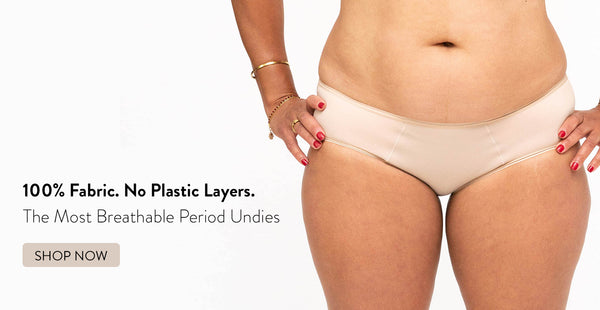What's the Deal with Vaginal Dryness During Your Period?
It might seem like vaginal dryness is the last problem you should be having during your period, especially if menopause is still two or three decades away.
But it can happen at any age (research suggests 17% of people aged 18-50 experience it), and menstruation is a common cause. That’s especially true if you have a light flow or your period takes a few days to get going.
If it happens to you (or you’re concerned it might), here’s what you need to know, and how to cope.
Why do vaginas become drier?
Vaginas are made up of mucous membranes – that is, bodily tissues which secrete mucus to keep the body lubricated. Estrogen is one of the main hormones involved in this process but levels drop just before and during your period, to let your body know it needs to release your egg and uterine lining. Your vagina may temporarily become drier as a result.
What problems can it cause?
A dry vagina means more friction, and while a little friction is a wonderful thing, too much is unpleasant. You might find it too painful to have sex or even insert a tampon. Other potential problems include irritation, itching, and being more prone to urinary tract infections (UTIs).
How can you deal with it?
It may get better on its own after a few days, as your body makes more estrogen. Until then, dabbing some water-based lubricant onto the end of a tampon might make it easier to insert. Be aware, though, that because tampons absorb fluid, they can make the problem worse, so consider switching to pads at least part of the time.
If you want sex to be more comfortable, make sure you’re as turned on as humanly possible before you start, and keep the water-based lube to hand. If that doesn’t do the trick, ask your doctor about vaginal moisturizers, which are re-applied every few days and have a longer-term effect.
What makes vaginal dryness worse?
If you’re stressed, anxious or depressed, mucous membranes throughout your body can dry up – including in the vagina.
Some medications are specifically designed to dry out mucous membranes, including over-the-counter cold medication and antihistamines. Meanwhile, others (such as birth control and some antidepressants) have it as a side-effect.
Avoid condoms or spermicides that contain nonoyxnol-9 (also known as N-9) as it’s been linked to vaginal dryness. And now, more than ever, stay away from perfumed vaginal sprays, as well as harsh soaps and washing powders, hot tubs and swimming pools (strong chemicals are not your friend).
What else can you do?
Do what you can throughout the month to prevent your vagina drying out when you’re on your period, like avoiding panty liners and drinking enough water (around 6-8 glasses a day).
Consider switching from tampons to pads, and check with your doctor to make sure none of your meds are making the situation worse.
Check out meditation techniques, or just lie on the couch with the latest series of Teen Wolf. There’s no guarantee that relaxing will help, but it’s unlikely to hurt.

